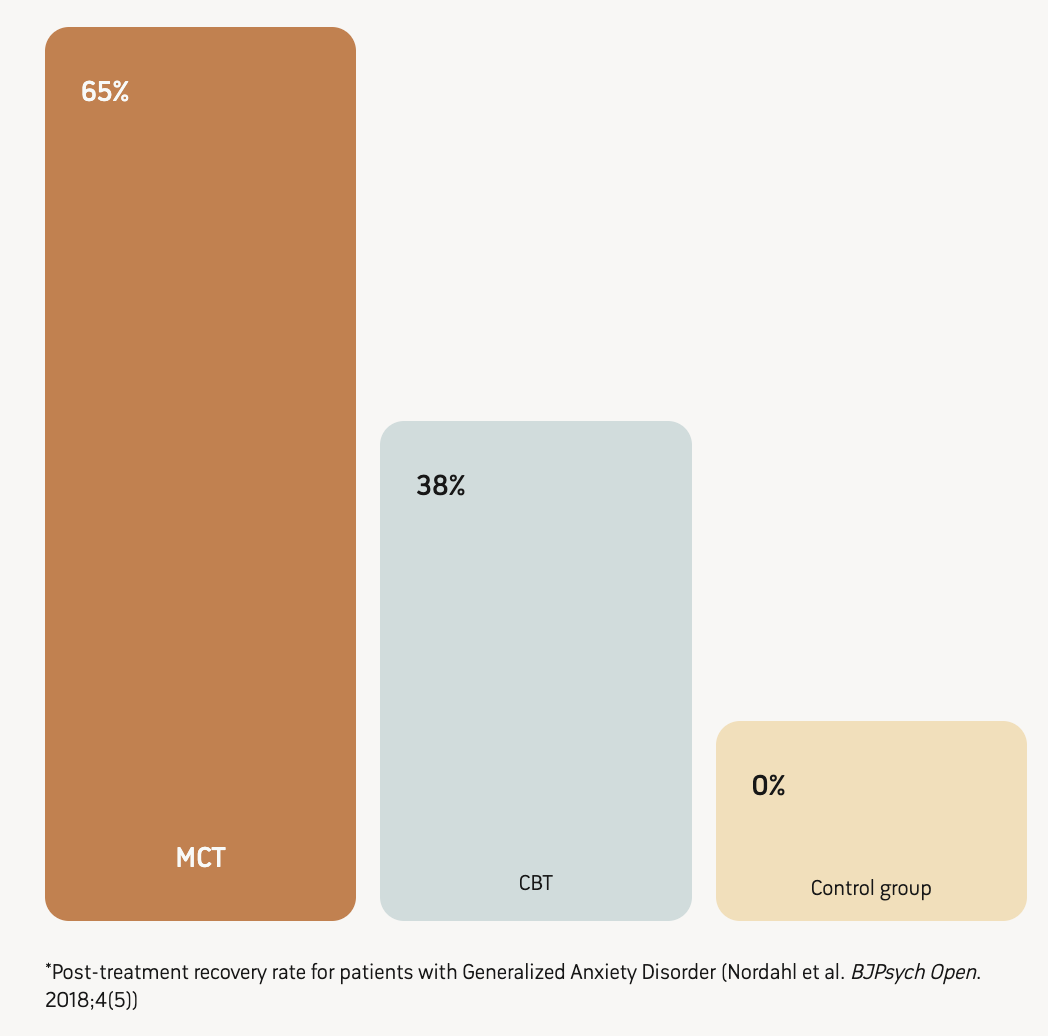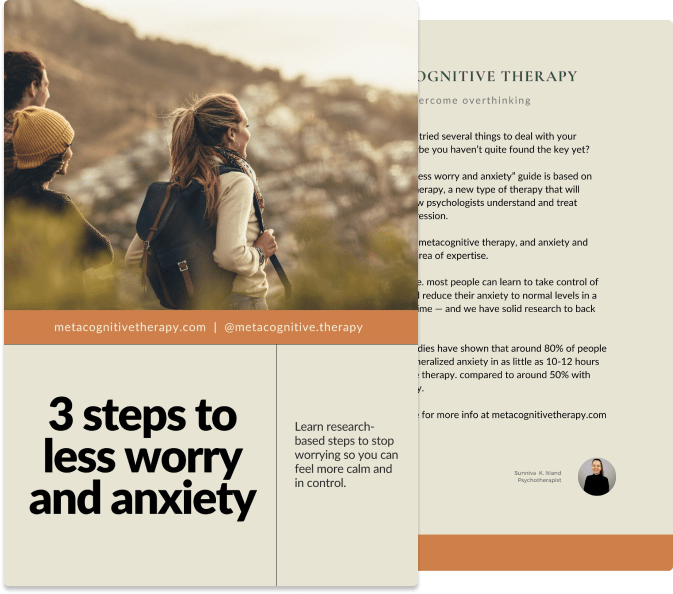9 Game-changing benefits of Metacognitive Therapy

Download our best tips on reducing anxiety and worrying
Learn three powerful metacognitive therapy steps to stop the worry cycle, reduce anxiety, and feel calmer in everyday life.


Imagine a therapy that helps you overcome overthinking... Metacognitive Therapy (MCT) is a refreshing new and effective form of psychotherapy that's rapidly gaining popularity, as it focuses on how you relate to your thoughts, rather than the thoughts themselves.
MCT is based around modifying the underlying processes and beliefs that regulate thinking and attention. It addresses the thinking styles and coping mechanisms that lead to prolonged emotional distress and mental illness.
So what are the distinct advantages of metacognitive therapy?
1. It's short-term and cost-effective
MCT often requires fewer sessions than traditional therapies, including Cognitive Behavioral Therapy (CBT), making it a cost-effective option. Achieving significant improvements in MCT therapy is typically possible in about 8-12 sessions. There is usually no need for long-term therapy. This is especially beneficial if you're looking for a treatment that fits into a busy schedule or if you're concerned about the cost of long-term therapy. The short-term nature of MCT means you can see results quickly.

2. MCT is to-the-point
Metacognitive Therapy distinguishes itself through its direct and efficient approach. MCT zeroes in on the processes that are keeping distress going rather than the content of thoughts, setting it apart from traditional therapies like CBT and talk therapies that often delve into the specifics of your history, trauma, and relationships. MCT provides concrete strategies for change through sessions that are structured to quickly identify and interrupt problematic processes such as overthinking and symptom monitoring.
3. MCT is practical, no-BS approach
In an MCT session, you focus on learning practical skills and gain essential knowledge about how the mind works that will help you stay out of cycles of worry and rumination. Instead of endlessly talking about past events, and dissecting every negative thought, you learn concrete ways to overcome the cycles that feed mental distress.

Download our best tips on reducing anxiety and worrying
Learn three powerful metacognitive therapy steps to stop the worry cycle, reduce anxiety, and feel calmer in everyday life.
4. Measurable progress
One of the standout benefits of Metacognitive Therapy is the ability to achieve and track measurable progress throughout the course of treatment. Unlike many approaches that may offer more subjective or qualitative improvements, MCT focuses on specific, quantifiable changes in your thought patterns and emotional well-being. This helps the therapist in providing tailored and effective treatment to help you reach your goals. It also enables your therapist to provide you with a better understanding of how far you've come on your road to recovery.
5. Proven effectiveness
Metacognitive Therapy has emerged as a highly effective method for treatment across a spectrum of mental disorders. Clinical studies have demonstrated substantial efficacy and a strong scientific base showcasing the benefits.
Studies have shown that MCT not only achieves high recovery rates, but also maintains these gains better over time. The fallback rates for general anxiety disorder and depression are significantly lower compared to CBT. Comparative studies show that MCT outperforms CBT across various metrics for a number of disorders [1].
6. MCT is transdiagnostic
Metacognitive Therapy research has shown that the same mental processes are involved in causing and maintaining all types of psychological issues. That's why it's very common for people to be diagnosed with multiple conditions, or to have more than one type of mental distress. The transdiagnostic nature of Metacognitive Therapy allows for the simultaneous treatment of multiple conditions, rather than addressing each disorder separately. This improves the timelines and overall effectiveness of the treatment. Learn more about the benefits of a transdiagnostic approach here.
7. It builds long-term resilience
The skills you learn in MCT aren't just for now — they're for life. By understanding how your mind works, and managing your thinking patterns differently, you can maintain good mental health over time, and prevent future relapses. After completing MCT treatment, you can continue to apply the valuable new insights you gained in therapy, which will empower you to deal better with triggering situations and challenges.
8. It requires less mental work
Metacognitive Therapy is not concerned with the content of your thoughts, but rather what you believe about your thoughts and how you relate to them. This is an important advantage because intrusive thoughts will continue to come in all shapes and sizes. MCT provides you with the understanding that all thoughts are simply thoughts. The approach to dealing with them remains the same: leave them alone or postpone dealing with them until later. This is in sheer contrast to other therapies, such as CBT, which rely on your ability to successfully negotiate with each individual negative thought and worry, which can take a lot of time and effort.
9. Self-empowerment
MCT shows you that you have control over how you respond to thoughts, feelings, and symptoms. This boosts confidence in your ability to manage challenging situations and emotions. For example, if you know that you can choose not to worry about an upcoming challenge, it might be easier to book that flight, say yes to that speaking engagement, or to commit to a date even if you feel scared. If you can view the anxious feelings and thoughts as passing mental experiences that don't require any action from you, you can more easily go on with your daily life instead of being consumed by dread and overthinking. This reduces the emotional impact of challenging events, and increases your confidence in handling future challenges.
The research-backed effectiveness and sense of empowerment you'll gain from MCT can be incredibly liberating in your journey to feeling more in control of your mental health. To get started and learn more about what actually happens in an MCT therapy session, check out this article on what to expect.
References
[1] Johnson, S. U., Hoffart, A., Nordahl, H. M., & Wampold, B. E. (2017). Metacognitive therapy versus disorder-specific CBT for comorbid anxiety disorders: A randomized controlled trial. *Journal of Anxiety Disorders, 50*, 103–112. https://doi.org/10.1016/j.janxdis.2017.06.004



